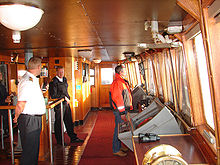Captain (nautical)

The master works with the harbour pilot, the chief mate and an able seaman during inner navigation aboard the vessel Kristina Regina.
|
|
| General | |
|---|---|
| Other names | ship's captain, ship's master, shipmaster, captain, master and other admittable variants |
| Department | Senior deck officer |
| Reports to | Ship's Flag State Authorities, sea's, coasts' and ports' State Authorities, owner and charterer |
| Location | At sea |
| Licensed | Yes |
| Duties | In charge of a merchant ship. |
| Requirements | master's license or extra master's license or commissioned officer |
| Watchstanding | |
| Watchstander | If needs |
A sea captain (also called a captain or a ship's captain or a master or a shipmaster) is a high-grade licensed mariner in ultimate command of the merchant vessel. The captain is responsible for its safe and efficient operation, including: ship's seaworthiness, ship's safety and security conditions, cargo operations, navigation, crew management and ensuring that the vessel complies with local and international laws, as well as company and flag state policies. All persons on board, particularly during navigation, including, public authorities, state authorities, officers and crew, other shipboard staff members, passengers, guests and pilots, are under the captain's authority and are his or her ultimate responsibility.
A ship's captain commands and manages all ship's personnel, and is typically in charge of the ship's accounting, payrolls, and inventories. The captain is responsible for compliance with immigration and customs regulations, maintaining the ship's certificates and documentation, compliance with the vessel's security plan, as mandated by the International Maritime Organization. The captain is responsible for responding to and reporting in case of accidents and incidents, and in case of injuries and illness among the ship's crew and passengers.
The captain ensures that the ship complies with local and international laws and complies also with company policies. The captain is ultimately responsible, under the law, for aspects of operation such as the safe navigation of the ship, its cleanliness and seaworthiness, safe handling of all cargo, management of all personnel, inventory of ship's cash and stores, and maintaining the ship's certificates and documentation.
One of a shipmaster's particularly important duties is to ensure compliance with the vessel's security plan, as required by the International Maritime Organization's ISPS Code. The plan, customized to meet the needs of each individual ship, spells out duties including conducting searches and inspections, maintaining restricted spaces, and responding to threats from terrorists, hijackers, pirates, and stowaways. The security plan also covers topics such as refugees and asylum seekers, smuggling, and saboteurs.
On ships without a purser, the captain is in charge of the ship's accounting. This includes ensuring an adequate amount of cash on board, coordinating the ship's payroll (including draws and advances), and managing the ship's slop chest.
...
Wikipedia
